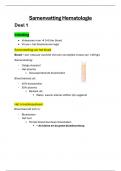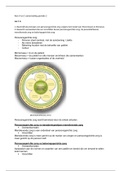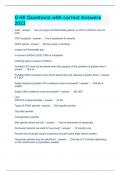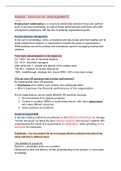Sustainability
Week 1
Sustainability is about social (humans), economic (investments and decent ways to pay bv
supplier), environmental (green) parts.
When companies are focussing on sustainability you see a lot more outcomes of their
products (adidas makes plastic stuff from plastic from the ocean).
Also consider waste of companies when saying if they are sustainable or not (are batteries
from Tesla toxic, or green?) (Tesla: innovation for a sustainable future)
1970:
The responsibility of management is (…) to make as much money as possible, while
conforming to the basic rules of society, both those embodied in law and those embodied in
ethical custom.” Business goes further than making profit and following the law.
1987: “Sustainable development is development that meets the needs of the present
without compromising the ability of future generations to meet their own needs.”
2018 teacher’s definition: sustainability is a process whereby a company assumes
responsibility, across its entire supply chain, for the social, ecological and economic
consequences of the company’s activities, reports on these consequences, and
constructively engages with stakeholders?
Social example/consequence: labour right standards are lower (bv. In Asia) and you find
slave intentions over there (work way too much for no money).
Problem with making a law for sustainability: it’s impossible to come up with a law/standard
that is required for all types of business.
EU has a law that requires big companies to report not only finance but as well a non-
finance report.
Law systems are national, you cannot have 195 countries under the same law.
Companies are challenging each other to get better with sustainability and find your future in
that. If companies are not coming with sustainability their future might be insecure.
Triple P:
• People (human/social capital): fair and beneficial business practices toward labour
and the community and region in which a corporation conducts its business.
• Planet (ecological/natural capital) refers to sustainable environmental practices.
• Profit (economical) is the bottom line
shared by all commerce.
Philanthropy = company with foundation to
give something to a good cause (example:
make a school in Brazil).
Economic stakeholders: customers,
suppliers, distributors
Organization stakeholders: employees,
managers, stockholders
Societal stakeholders: communities,
government, non-profits, NGO’s,
environment.
If you are successful managing all those stakeholders, you have a good sustainable
management.
,Strategy is made by
management. Sustainability
should be a normal part of
business, the same as
marketing. It’s not enough to
just donate to good causes!!
It’s not bad to have a
foundation but also be able to
manage your company with
real sustainability.
History: …. But still
developing topic!
When companies replaced
their fabrics to Asia, they did
not think it was their
responsibilities with for
example the human rights.
• 1976: OECD Guidelines for Multinational Enterprises
How to do sustainable management
1977: ILO Tripartite Declaration of Principles concerning Multinational
Enterprises and Social Policy
• 2011 - Guiding Principles on Business and Human Rights (John Ruggie)
Good book to see for company’s if they are covering their sustainable rights. Adopted
by United Nations Human Rights. First international standard for the prevention and
acknowledgement of the risk that business activities have a negative impact on
human rights.
2015: Sustainable Development Goals (SGD).
- In 2015 the UN General Assembly formally accepted a new set of 17 measurable
Sustainable Development Goals (SDGs), ranging from ending world poverty to
achieving gender equality and empowering women and girls by 2030.
- These are to succeed the Millennium Development Goals (MDGs), a set of eight
measurable goals which were signed in September 2000
17 goals of sustainability. As a company, pick 3 or 4 goals and take them in your
business. (example: avans takes quality education).
, Why sustainability?
Sustainable is not only costing money, its positive if you do it. They perform better:
customers appreciate it, companies who do sustainability are covering risks better, do know
better what is happening in the world, so they are a leading company.
The business case:
• Ecological efficiency: competitively priced, meet human needs, good quality, capacity
of the earth.
• Social efficiency: create jobs, wages, work accidents, harassment of workers, human
rights.
Advantages:
• Human resources: bind employees
• Manage risk and reputation
• Brand differentiation
• License to operate (pay tax, adhere to regulation, good corporate citizenship)
Reasons according to Harvard, the business case for CSR in 2011:
- implement cost and risk reductions;
- gain competitive advantage;
- develop corporate reputation and legitimacy; and
- seek win-win outcomes through synergistic value creation.
Summary
• Sustainability policy only credible when implemented in overall company strategy /
management, across organisation, in all business units.
• Sustainability policy should relate to core activities of company.
• Sustainability or innovation or stakeholder engagement or leadership? (how do
you call it?)
Sustainability week 2
Business ethics
The study of moral principles: (something to do with business ethics)
- personal level
- corporate level
- what is the difference?
Principles are specific boundaries (limitations) for human behaviour that are
universal and absolute, such as:
- Freedom of speech
- Fundamentals of justice (eg. fair trial, access to a court)
- No discrimination (eg. equal treatment)
- Civil rights
Principles often become the basis for rules (or laws). (laws are based on certain
principles that we all agree on).
Values are used to develop norms that are socially enforced:
- Integrity (corporate with each other). Personal and professional integrity.
- Trust
- Accountability
- Honesty
Week 1
Sustainability is about social (humans), economic (investments and decent ways to pay bv
supplier), environmental (green) parts.
When companies are focussing on sustainability you see a lot more outcomes of their
products (adidas makes plastic stuff from plastic from the ocean).
Also consider waste of companies when saying if they are sustainable or not (are batteries
from Tesla toxic, or green?) (Tesla: innovation for a sustainable future)
1970:
The responsibility of management is (…) to make as much money as possible, while
conforming to the basic rules of society, both those embodied in law and those embodied in
ethical custom.” Business goes further than making profit and following the law.
1987: “Sustainable development is development that meets the needs of the present
without compromising the ability of future generations to meet their own needs.”
2018 teacher’s definition: sustainability is a process whereby a company assumes
responsibility, across its entire supply chain, for the social, ecological and economic
consequences of the company’s activities, reports on these consequences, and
constructively engages with stakeholders?
Social example/consequence: labour right standards are lower (bv. In Asia) and you find
slave intentions over there (work way too much for no money).
Problem with making a law for sustainability: it’s impossible to come up with a law/standard
that is required for all types of business.
EU has a law that requires big companies to report not only finance but as well a non-
finance report.
Law systems are national, you cannot have 195 countries under the same law.
Companies are challenging each other to get better with sustainability and find your future in
that. If companies are not coming with sustainability their future might be insecure.
Triple P:
• People (human/social capital): fair and beneficial business practices toward labour
and the community and region in which a corporation conducts its business.
• Planet (ecological/natural capital) refers to sustainable environmental practices.
• Profit (economical) is the bottom line
shared by all commerce.
Philanthropy = company with foundation to
give something to a good cause (example:
make a school in Brazil).
Economic stakeholders: customers,
suppliers, distributors
Organization stakeholders: employees,
managers, stockholders
Societal stakeholders: communities,
government, non-profits, NGO’s,
environment.
If you are successful managing all those stakeholders, you have a good sustainable
management.
,Strategy is made by
management. Sustainability
should be a normal part of
business, the same as
marketing. It’s not enough to
just donate to good causes!!
It’s not bad to have a
foundation but also be able to
manage your company with
real sustainability.
History: …. But still
developing topic!
When companies replaced
their fabrics to Asia, they did
not think it was their
responsibilities with for
example the human rights.
• 1976: OECD Guidelines for Multinational Enterprises
How to do sustainable management
1977: ILO Tripartite Declaration of Principles concerning Multinational
Enterprises and Social Policy
• 2011 - Guiding Principles on Business and Human Rights (John Ruggie)
Good book to see for company’s if they are covering their sustainable rights. Adopted
by United Nations Human Rights. First international standard for the prevention and
acknowledgement of the risk that business activities have a negative impact on
human rights.
2015: Sustainable Development Goals (SGD).
- In 2015 the UN General Assembly formally accepted a new set of 17 measurable
Sustainable Development Goals (SDGs), ranging from ending world poverty to
achieving gender equality and empowering women and girls by 2030.
- These are to succeed the Millennium Development Goals (MDGs), a set of eight
measurable goals which were signed in September 2000
17 goals of sustainability. As a company, pick 3 or 4 goals and take them in your
business. (example: avans takes quality education).
, Why sustainability?
Sustainable is not only costing money, its positive if you do it. They perform better:
customers appreciate it, companies who do sustainability are covering risks better, do know
better what is happening in the world, so they are a leading company.
The business case:
• Ecological efficiency: competitively priced, meet human needs, good quality, capacity
of the earth.
• Social efficiency: create jobs, wages, work accidents, harassment of workers, human
rights.
Advantages:
• Human resources: bind employees
• Manage risk and reputation
• Brand differentiation
• License to operate (pay tax, adhere to regulation, good corporate citizenship)
Reasons according to Harvard, the business case for CSR in 2011:
- implement cost and risk reductions;
- gain competitive advantage;
- develop corporate reputation and legitimacy; and
- seek win-win outcomes through synergistic value creation.
Summary
• Sustainability policy only credible when implemented in overall company strategy /
management, across organisation, in all business units.
• Sustainability policy should relate to core activities of company.
• Sustainability or innovation or stakeholder engagement or leadership? (how do
you call it?)
Sustainability week 2
Business ethics
The study of moral principles: (something to do with business ethics)
- personal level
- corporate level
- what is the difference?
Principles are specific boundaries (limitations) for human behaviour that are
universal and absolute, such as:
- Freedom of speech
- Fundamentals of justice (eg. fair trial, access to a court)
- No discrimination (eg. equal treatment)
- Civil rights
Principles often become the basis for rules (or laws). (laws are based on certain
principles that we all agree on).
Values are used to develop norms that are socially enforced:
- Integrity (corporate with each other). Personal and professional integrity.
- Trust
- Accountability
- Honesty










